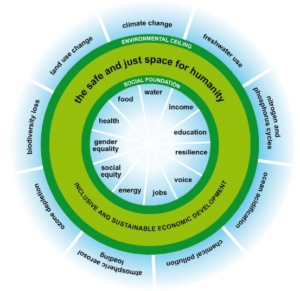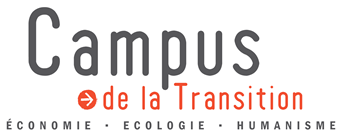ACADEMIC TEACHING, RESEARCH, EXPERIMENT. A Campus to Master the issues and tools of the ecological and social transition
We stand at a critical moment in Earth’s history, a time when humanity must choose its future. As the world becomes increasingly interdependent and fragile, the future at once holds great peril and great promise. To move forward we must recognize that in the midst of a magnificent diversity of cultures and life forms we are one human family and one Earth community with a common destiny. We must join together to bring forth a sustainable global society founded on respect for nature, universal human rights, economic justice, and a culture of peace. Towards this end, it is imperative that we, the peoples of Earth, declare our responsibility to one another, to the greater community of life, and to future generations.
Preamble of the Earth Charter*
* Citizens’ initiative text supported by the Rio Earth Summit of 1992. Developed following an unprecedented global consultation process, it was launched in March 2000 after taking into account the contributions of people from all regions of the world. It is part of the reference texts of all major institutions and international NGOs.

The Doughnut of social and planetary boundaries, Kate Raworth, 2017
Why a Campus For Transition?
Tackling energy, climatic, environmental and societal issues requires designing new economic models, new indicators of quality and performance, new ways to consume, to manage our resources, to apprehend time (integrating long term strategies) and space (from local to global), new criteria to discern what is good and desirable from what is not, and new deliberation, coordination and decision-making processes.
There are very few academic institutions which gather new knowledge and emerging concepts on those questions, and which assume a leading role in their teaching to new generations, businesses, public institutions and civil society as the major players of a successful systemic transition of our societies.
The Campus for Transition aims to be such an innovative academic institution, bringing together researchers, instructors and scholars around four leading academics on the transition issues, from internationally recognized schools: Cécile RENOUARD, philosophy and ethics (ESSEC, Sciences Po, Centre Sèvres), Campus founder; Gaël GIRAUD, economics (Ecole Normale Supérieure, AFD); Alain GRANDJEAN (Ecole Polytechnique), energy transition, entrepreneur, co-founder of Carbone4 and Gilles LHUILIER, law (Ecole Normale Supérieure, FMSH).
As a non-profit organization, the Campus is complementary to today’s Universities and Business schools and not a competitor. It offers 2 weeks to 2 months educational programs as well as research and experimentation courses applied on the Campus site, an area itself in transition process, 1 hour away from Paris.
Teaching contents
- Transdisciplinary teachings: Transition economy; Responsible Management; Sustainable Finance and Accounting; Law and globalization; Environmental Humanities; Epistemology of Environmental Sciences; Ecology, Philosophy, Ethics and Spirituality
- A holistic and fundamental approachto understanding why ecology has become a major prism for reading the world and how it relates to all the dimensions of life and human activities
- Tools to set up their implementation in multiple contexts and sectors
- A radically new pedagogy in a place where research and experimentation go together, in the Forges domain, where the Campus is based. Living what is taught is paramount to integrate the transition issues, and their solutions, on a personal and collective basis
A team of high level academics and instructors
Economics and Finance
- Gaël Giraud, PhD, Chief economist AFD, CNRS
- Alain Grandjean, PhD, CEO Carbone 4;
Accounting and management :
- Patricia Langhor, PhD, ESEC Business School
- Jacques Richard, PhD, Professor Univ. Paris Dauphine
Climate and environmental Sciences:
- Marie-Antoinette Mélières : PhD, CNRS
Development Economics:
- Isabelle Guérin, PhD, Professor, Univ. Paris VII and IRD
- Xavier Ricard Lanata, PhD, anthropologist, AFD
Environmental Humanities:
- Christophe Bonneuil, PhD, CNRS, EHESS Business School
Law and Political Sciences:
- Loic Blondiaux, PhD, Professor Paris I Panthéon Sorbonne
- Gilles Lhuilier, PhD, Professor Ecole Normale Supérieure, FMSH
Management:
- Raffi Duymedjian, PhD, Professor Grenoble Ecole de Management
- Dominique Steiler, PhD, Professor Grenoble Ecole de Management
Pedagogy of Transition:
- Jonathan Dawson: Head of economics Schumacher College (UK)
Philosophy and Ethics:
- Dominique Bourg, PhD, Professor Univ. of Lausanne (Switzerland)
- Jean-Philippe Pierron, PhD, Professor Univ. Lyon 3
- Cécile Renouard, PhD, Professor Centre Sèvres, ESSEC Business School, Ecole des mines de Paris
Sociology:
- Patrick Caron, PhD, Professor Univ. Montpellier, CIRAD
- Dominique Meda: PhD, Professor Univ. Paris Dauphine
And young researchers
- Swann Bommier, PhD, Political Sciences, associate researcher Science Po and ESSEC Business School
- Emeline Baudet, PhD candidate, Literature, Univ. Paris Sorbonne and AFD
- Pierre-Jean Cottalorda, PhD, Economics, associate researcher ESSEC Business School and Campus de la Transition
- Cécile Ezvan, PhD, Management and Philosophy, associate researcher ESSEC Business School
- Hélène L’huillier, PhD, Development Economics, consultant
- Antoine Rieu, PhD candidate, Socio-economics, ESSEC Business School and Univ. Paris Diderot
And actors from the economic, social and public spheres…
Modular and adjustable Academic programs
Short courses
- 2 to 5 days : awareness and / or thematic approach
- For students or professionals from the same company
- To acquire a clear vision of transition issues:
- A rigorous approach of new ecological, economic, societal and cultural indicators
- Understand crossed impacts of ecology, social inequalities and ways of life
University certificates
- 2 weeks to 2 months: immersion, fundamentals and tools
- For French and international students
- Immersive program earning academic credits
- To integrate ecological and social transition tools:
- Trans-disciplinary approach of complexity
- Initiation to permaculture studies as an illustration of a paradigm shift
- Governance and Commons
Masters (starting fall 2020)
- Masters « transition studies »
- Masters « ecology, ethics and spirituality »
- Executive program « Oïkonomia: companies and organizations in transition »
